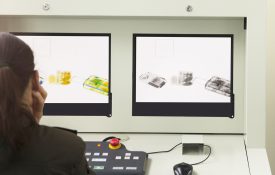-
Bursting people’s political bubbles could make them even more partisan
Politics is polarizing enough, especially when it's easier than ever to find a group of like-minded friends online. The antidote, then, seems obvious: pop the bubble. Step outside the echo chamber. Reach out for other points of view. For example, to combat the rampant spread of hate speech, harassment and conspiracy theories, Twitter started "experimenting with features that would promote alternative viewpoints in Twitter’s timeline to address misinformation and reduce 'echo chambers,' " The Post recently reported. But breaking the bubble, it turns out, might not work. It might even backfire.
-
How to Make the Best First Impression, According to Experts
Everyone can make snap judgments, especially when meeting someone new. In less than one-tenth of a second of seeing someone for the first time, our brain processes information about the person’s face—which leads to quick conclusions about a new acquaintance’s qualities, including trustworthiness, competency, friendliness, honesty and morality—according to a 2006 study published in Psychological Science. This tendency dates back to evolutionary times, when we would encounter strangers and, for survival purposes, need to assess whether they would inflict harm or be an ally, says Vivian Zayas, a professor of psychology at Cornell University.
-

You Probably Made a Better First Impression Than You Think
After we have conversations with new people, our conversation partners tend to like us and enjoy our company more than we think.
-

Harnessing the Power of the Crowd Could Improve Screening Accuracy
Averaging the results from two independent participants improved screening accuracy, whether participants were looking at baggage scans or mammograms.
-
How to Play Our Way to a Better Democracy
Before he died, Senator John McCain wrote a loving farewell statement to his fellow citizens of “the world’s greatest republic, a nation of ideals, not blood and soil.” Senator McCain also described our democracy as “325 million opinionated, vociferous individuals.” How can that many individuals bind themselves together to create a great nation? What special skills do we need to develop to compensate for our lack of shared ancestry? When Alexis de Tocqueville toured America in 1831, he concluded that one secret of our success was our ability to solve problems collectively and cooperatively.
-
Playtime May Bolster Kids’ Mental Health
“Play has become a four-letter word.” So says Kathy Hirsh-Pasek, a psychologist at Temple University and one of the authors of a new paper about the importance of play in children’s lives. The clinical report, published by the American Academy of Pediatrics, recommends that pediatricians write a “prescription for play” at doctor visits in the first two years of life. Years of research have shown that play is an important part of a child’s development, assisting in cognition, memory, social skills, and, to a lesser extent, maybe even mental health. Yet, according to the paper, children in the United States play less, and have less free time, than in decades past.

